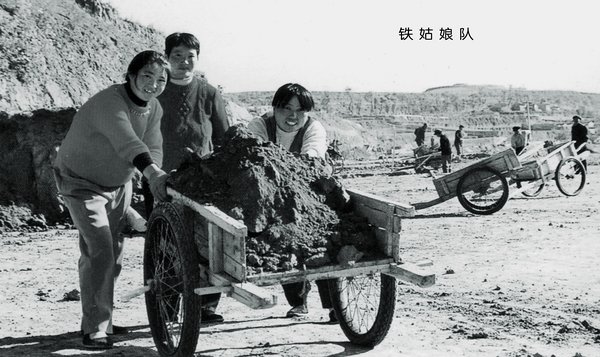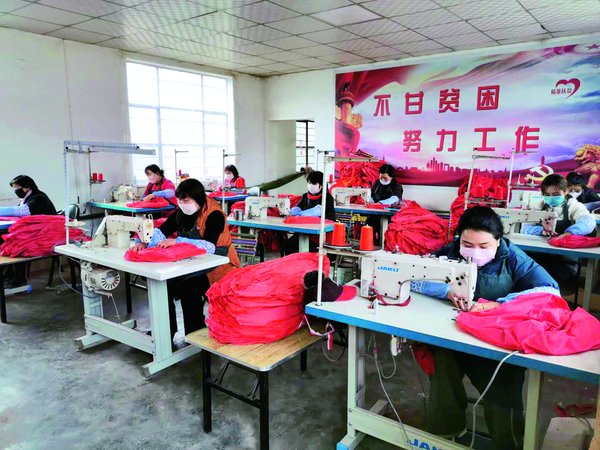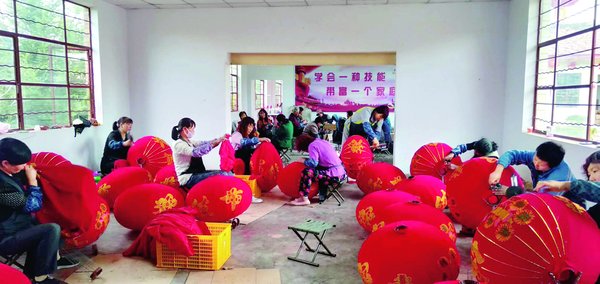Zhuanglang Has New Look After 34 Years of Hard Work
 |
| File photo of the team of "iron women," the earliest group of people to reclaim the wasteland in Zhuanglang County, who spent their youth working diligently on the land they loved. |
Invigorating the Ground
Zhuanglang, located on the western side of Mount Liupan, is one of the 18 counties in Northwest China's Gansu Province that suffered through drought for years. The land condition in Zhuanglang was extremely poor in the past. Locals used to suffer from poverty and hunger. In 1964, people in Zhuanglang answered the central government's call to reclaim the wasteland by building bench terraces, so they could develop agricultural production. During the following 34 years, the people of Zhuanglang reclaimed 63,000 hectares of land and increased annual grain output by an average of 51.97 million kilograms.
Of the earliest group of people to reclaim the wasteland was a team of "iron women." Luo Fandiao, then leader of the trio that started the team, selected more than 20 women, all of whom were younger than 20, to form the team. Those "iron women" worked as hard as their male counterparts. To complete their workloads on time, the women sometimes stayed overnight at the place where they were reclaiming wasteland. They slept in carts, which they used to carry soil. Luo was known in Zhuanglang as a "heroine on the loess land." She worked diligently for 10 years. Her hands had many thick calluses. Due to being overtired, Luo and other women of her team were not able to stand straight.
Chen Ying, now in her sixties, joined the "iron women" when she was young. She still remembers clearly the movements used when using an iron pestle to tamp the soil. She repeated that act countless times. "Going to the place where we were reclaiming wasteland was like going onto a battle field. We must complete our missions. If we could not finish our work during daytime, we continued working into over the night," Chen recalls.
During a speech contest, hosted by the All-China Women's Federation last year, Zhang Hanchi, from Gansu Province, shared a story about Zhuanglang during her presentation. Zhang also displayed a painting by primary school students from Zhuanglang. "The students painted the beautiful bench terraces in their hometown. As we look at the terraces, covered by green trees and plants, we show our respect to the 'iron women', who spent their youth working diligently on the land they loved so much," Zhang said.
 |
| Workers at work in a workshop. The women's federation of Zhuanglang County encouraged enterprises, including women entrepreneurs, to establish poverty-alleviation workshops, in which women from impoverished families are taught various processing skills, so they can earn a living to support their families. |
Workshops Boost Industrial Development
After 34 years of hard work, the fertile bench terraces have enabled people in Zhuanglang to expand the county's traditional farming industry. The locals have also boosted industrial production in other sectors to help the left-behind workforce, especially women who stay in their hometown to look after their families, earn stable incomes and shake off poverty.
The women's federation of Zhuanglang County has encouraged enterprises, including women entrepreneurs, to establish poverty-alleviation workshops, in which women from impoverished families are taught various processing skills, so they can earn a living to support their families.
Liu Caixia established her first "women's poverty-alleviation workshop" in Wangzhuang Village, Shuiluo Town, in Zhuanglang, in 2017. She hired more than 50 women from impoverished families. Later, Liu established several workshops in other towns, and she set up six clothes processing lines. She had 200-plus regular employees, including more than 50 employees from registered poverty-stricken households.
Song Xiaoxia, another businesswoman in Zhuanglang, opened the county's first workshop that specialized in producing decorative palace lanterns. "My workshop is not big, but we sell the lanterns quite well," Song says. By signing contracts with enterprises in Shijiazhuang, in North China's Hebei Province, Song receives orders on a regular basis, which helps guarantee her employees' stable incomes.
 |
| Workers at work in a workshop. The women's federation of Zhuanglang County encouraged enterprises, including women entrepreneurs, to establish poverty-alleviation workshops, in which women from impoverished families are taught various processing skills, so they can earn a living to support their families. |
The "women's poverty-alleviation workshops" in Zhuanglang have enabled 1,100-plus rural women to work in their hometowns, and to escape poverty.
Zhuanglang has the county's poverty-alleviation mode. The county's committee of the CPC encourages State-owned enterprises to take an initiative and help local cooperatives, which provide employment to residents from impoverished households, so the residents can increase incomes.
During the six-year period from the end of 2013 to the end of 2019, some 136,100 people from 31,300 households in Zhuanglang had shaken off poverty.
Adhering to the efforts made by members of the "iron women" team, women of Zhuanglang County, in the new era, are continuing to build their beautiful hometown on the prosperous land.
Photos Supplied by Fan Wenjun and Women's Federation of Zhuanglang County
(Women of China English Monthly March 2020 issue)
Please understand that womenofchina.cn,a non-profit, information-communication website, cannot reach every writer before using articles and images. For copyright issues, please contact us by emailing: website@womenofchina.cn. The articles published and opinions expressed on this website represent the opinions of writers and are not necessarily shared by womenofchina.cn.

 京公网安备 11010102004314号
京公网安备 11010102004314号